19 My Spiritual Journey: Dissolving Barriers through a Conscious Connection with Nature
Liz Heneghan
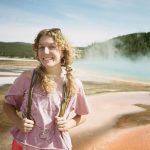
Hello, I’m Liz! I was exposed to a number of courses as a student within the School of Environment and Natural Resources, but the Religion and Environmental Values in America content sparked my curiosity the most. This course facilitated a deeper understanding of the people, places, and experiences that have shaped me into the person I am today. My chapter is a direct reflection of those thoughts and I hope my words encourage some self-exploration in you as well…read more.
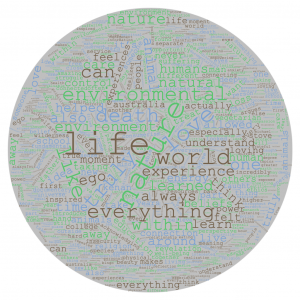
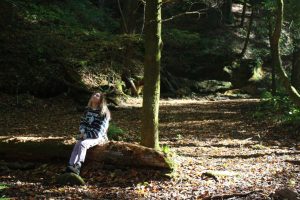
I am constantly inspired by nature and the idea that taking care of myself means taking care of the environment. Whether I realized it or not, religion has always shaped my beliefs about personal identity and responsibility in the world. I went to Catholic school my entire K-12 career, but never truly resonated with the beliefs taught to me. It was not until high school that I became more connected to a higher power. A service retreat to Louisville, Kentucky, sparked this spiritual awakening. That was nearly four years ago, and today I am still exploring topics like animal welfare, environmental ethics, death, the need to control, and unselfing.
After walking for what seemed like days, I was thankful to finally escape the sticky heat that accompanies Louisville summers. As I entered the dilapidated building, the only thing I could think about was the welcoming embrace of the crisp air conditioning. My moment of peace was short-lived as I caught sight of a baby gate a few feet ahead. Traces of nervousness crept up my body as the curiosity of what lay behind it overwhelmed me. “B-12…O-64…I-19.” I heard the distant sounds of bingo. I looked around and noticed the crayon-colored drawings that plastered the walls. I felt as if I were in a Kindergarten classroom, but the room was filled with adults. My wandering mind was quickly interrupted by shouts of welcome as the staff introduced me to my new home for the week.
After being introduced to the adults living with developmental disabilities, I found myself conversing with a middle-aged man. He repeated himself for the third time, “Get away from the stove; it’s hot.” I gave him a bewildered look as my eyes searched the room for a stove. “What is he talking about?” I asked myself. I kept listening, trying to make sense of what he was saying. I was tempted to nod and act like I understood just so I could walk away. No, that would be too easy. My focus remained on the man as I desperately tried to understand him. He repeated the phrase again. Listen. Listen harder. Suddenly, I grasped the meaning behind his persistent manner. I could not help but smile at this stranger’s concern for my well-being. “Yes, I will stay away from the stove, thank you.” He looked at me with an appreciative smile. A feeling of relief replaced my nervousness, and I realized I was eager to learn more about this man whose name I found out later was Kenan. He started speaking again. I listened.
This service opportunity allowed me to re-evaluate my perspective on all aspects of life. Together, Kenan and I colored, discussed the food we liked, danced, and played bingo. Although these activities may seem childish, they helped me truly get to know Kenan. He expressed so much concern for the well-being of everyone in his life, including me: his new friend! His compassion shined through as he continually warned me and others to “stay away from the stove.” Kenan’s thoughtfulness has inspired me to be a more caring and loving person, even to those I’m not familiar with. This encounter has also inspired me to be a voice for those who cannot be heard. I could have easily pretended to know what Kenan meant, but by listening with a purpose, I was able to form a deep connection and truly understand what he was trying to say. Although Kenan was significantly different than me in many ways, we did share one thing. And that was love.
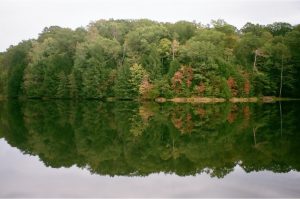
The realization that love connects all of us was further deepened during this service retreat when I visited the Abbey of Gethsemani. I had never visited a monastery before so this experience was very eye-opening. My perspectives were widened as I learned about spiritual practices I had never heard of. The true transformation occurred during a solo reflection in nature. My peers and I were instructed to spend an hour in nature around the Abbey of Gethsemani’s property in complete silence away from one another. I wandered throughout the woods and came across a small lake. I vividly remember sitting on a bench overlooking the lake and an expansive field of wildflowers. The sun was beating down and it was the first time I truly meditated in my life. Throughout the entire hour, I was fully entranced in the present moment transcending before me. I have always felt connected to nature, but this reflection kickstarted the revelation that nature and religion are interconnected. The natural world felt more like a church than any physical building I had been in.
This was also the period of time I became vegetarian and more interested in environmental ethics. My junior year of high school crept up quickly and the most pressing topics discussed were colleges and their respective majors. I had no idea what I wanted to pursue in terms of higher education, but little did I know that revelation would come soon. I stumbled upon environmentalism when my environmental science teacher, Mrs. Becker, recommended we watch the documentary Gasland for further information on energy sources. This film exposed the horrors of natural gas and fracking and led me down a rabbit hole of environmental documentaries. I became so interested in the issues plaguing our world, especially since I had such a deep connection with nature. Cowspiracy was the next documentary I watched, which exposed the horrors of animal agriculture. I was filled with anger for myself and everyone else for being so oblivious to the origins of our food. I immediately began my transition to a vegetarian diet after watching this documentary. I took on an extremist view of animal rights, believing that no animal should be killed at all. Fast forward to four years later, I am still vegetarian but have a much more relaxed yet conflicted view on the topic. On one hand, I agree with Peter Singer’s argument in All Animals Are Equal. Equality, Singer states, is less about identical treatment and more about equal consideration. Regardless of race, perceived intelligence, physical ability, or sex, each human and animal should have the same considerations when it comes to actions like suffering: “If possessing a higher degree of intelligence does not entitle one human to use another for his or her own ends, how can it entitle humans to exploit nonhumans for the same purpose?” (Singer, 1990). On the other hand, I think the concept of animal welfare is more realistic considering the varying levels of health and access to food across the world. That being said, I lean more towards animal welfare now because I don’t expect everyone to stop consuming animals, but I want them to do it in the least painful way possible. I also think eating locally can be more beneficial than eating completely cruelty-free in terms of environmental impacts. More often than not, if you choose to eat from locally-owned farms, these operations are free-range and treat their animals with respect. Overall, when I went vegetarian I felt a massive shift within myself. All of a sudden I opened my eyes to the suffering of others in this world. I felt like I was actually living out my beliefs as a compassionate person.
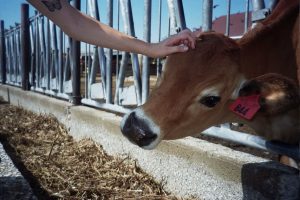
These documentaries sparked a passion in me I never had experienced before. It was the first time I questioned my life-long beliefs and actions. I began to do more research through journal articles, books, podcasts, and YouTube videos. I suddenly found the answer to all my worries about what I wanted to study at college. This passion was strengthened when I completed job shadowing at the Cleveland Metroparks as a naturalist intern. I was stationed at the Watershed Stewardship Center at West Creek. Over the course of three days, I helped assemble a Monarch Waystation to create habitat for the declining species, learned about environmental education efforts, and even traveled to a nearby elementary school to educate students about Monarch rehabilitation. I loved that environmentalism allowed me to think outside of myself and truly understand the impact I had on the world. All of these experiences reaffirmed my interest in pursuing an environmental degree in college.
College has provided me with so many amazing opportunities to explore every aspect of my life. I have always been open to new experiences and learning which has helped me make the most out of my undergraduate career. I learn more and more about my place in the natural world with every class I take, person I meet, and experience outside of my comfort zone. My studies within the School of Environment and Natural Resources have allowed me to delve deep into the wilderness and gardener ethics. Enrolling in the Religion and Environmental Values in America class in my third year of undergrad was especially insightful. It was here that I was introduced to the writings of Michael Pollan. Michael Pollan’s Second Nature: A Gardener’s Education reinforced the idea that humans are a part of nature, not separate. Every action I take mirrors this belief because when I care for the environment, I am also caring for myself. Experiencing this notion outside of the classroom has helped me truly understand the interconnectedness of everything. A pivotal moment in my first year of college was when I participated in a weekend caving trip through the Outdoor Adventure Center. This experience tested my trust in myself and the natural world. I confronted my physical abilities by wedging myself between rocks, army crawling through underground rivers, and scaling steep indoor mountains. I am incredibly grateful to have countless hiking and camping experiences like this one to remind myself how amazing it is to feel alive. Wilderness experiences are profoundly transformational because they often trigger discussions and questions of the bigger things in life. Pollan (1991) argues that the idea of wilderness has driven a large wedge between man and nature because it makes a distinction between the two, but it has actually helped me see more of myself in nature.
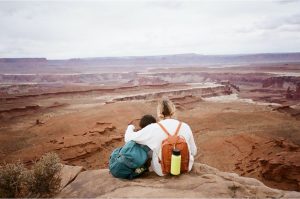
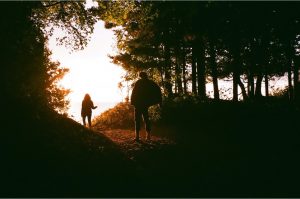
Education abroad in Australia further promoted this connection by allowing me to take a step back and reevaluate my priorities in life. I transformed from someone who was going through the motions of life to someone who truly lives in the moment and appreciates the world around me. I knew Australia was going to be an amazing experience, but it was more impactful to my life than I could have ever imagined. I completed a 3.5-week experiential program that uses the theme of sustainable development to explore the relationship between people and their natural environment. I was immersed into a whole new world of wildlife, able to hike and live in unique ecosystems such as rainforests, form meaningful friendships, and learn all about the management decisions that go into protecting the beautiful resources in North Queensland. When I look back on my time in Australia, the most valuable lesson I learned is the power of human connection. The digital detox allowed me to fully embrace every moment and connect with the individuals around me. I felt so close to my peers and the land we were living on within a matter of days. This experience also opened my eyes to what is actually being done to protect the environment and gave me the opportunity to actively learn in the field. Our guides led us on extensive hikes while pointing out different plant and animal species. We also engaged in debates acting as different stakeholders to understand all the varying perspectives that come with environmental management. My favorite part was witnessing the beauty and magic of the Great Barrier Reef. The life within the ocean depths is like nothing I have ever seen before. I was in complete awe by the mountains of coral and schools of fish everywhere I looked. My peers and I conducted transects at different locations to determine the number of species and overall health of the reef. I am so incredibly lucky to have had this experience and I want future generations to have the same opportunity as well. I left Australia feeling even more inspired to protect the Earth, confident in the valuable information I learned, and connected to all that surrounds me.
Confronting death with the loss of my father in 2018 has been a constant journey of healing. While it is unfortunate I have such a close connection with death, the grieving process has allowed me to delve deep into my personal beliefs concerning the meaning of life and death. We are all looking for something far, far beyond ourselves. The death of my father reminded me of this longing and what is truly important in life. Love really is all we’ve got. It’s all we take to our graves, our only legacy, our only everything. It allows us to connect with others and learn more about ourselves. You’d almost think it’s too simple, that it all must be more complicated than love, but it’s not. The only way we can fulfill this longing is by stepping out of our comfort zone and into the perspective of others. I’m thankful for the nineteen years I had with my father. His restless, adventurous spirit that taught me there is always something more to learn and someone to meet. He always encouraged me to follow my dreams and he worked incredibly hard to get me where I am today. I still struggle with the grief of my father’s passing, but I am at peace knowing he is not suffering anymore and is on the next path in his eternal journey.
In Our Need to Control: Implications for Environmental Education, Richard A. Baer argues that American culture has few of the rites of passage common in most primitive cultures though which the adolescent learns to confront death. Primitive individuals learn from a young age that death is a process in which someone gets closer to the divine. In a contemporary world where humans seek to control everything, this “final loss of control” has a much more negative perception. Baer’s claim hit close to home because of my own experience with death. I agree that Westerners have lost touch of the meaning of death, but for myself, losing my father has made me both more scared and more open to mortality. It taught me how truly fragile life is and made me scared of losing anyone else I care deeply about. Moreso, this loss has given me the motivation to live the life I truly want to live and allowed me to explore the idea of reincarnation. One of the laws of thermodynamics is energy cannot be created or destroyed, it is merely transferred from one party to the next. Since everything is made of energy, death can be viewed as a transfer instead of a loss. Exploring reincarnation has helped me gain a greater appreciation for the little things in life. I see my dad in everything, especially nature: butterflies, water, birds, the sky. Nature has helped me process this loss by showing me true love lasts and is always around me.
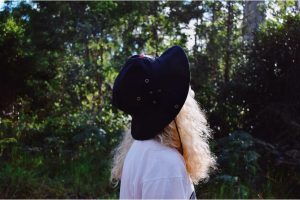
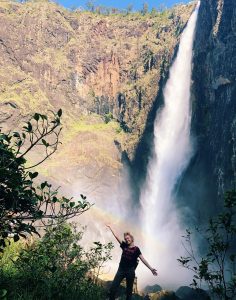
In this current moment, I feel like I am tapping into something greater than myself. As Iris Murdoch calls it, I am “unselfing” through love for myself and others. I believe there is a divine force connecting everything together within the universe. I consider this my own religion because I am having a very wholesome time educating myself with various experiences, sources, and beliefs. I have experienced a shift in consciousness. It is almost like an interior conversion like Pope Francis mentions in Laudato Si’. I changed my mindset from I am hurting to I am healing. I am the happiest I have ever been because I am prioritizing love in my life. I am loving myself by loving the parts of me existing in everything else. As Iris Murdoch states, “love is any relationship through which we are called from our own self-involvement to appreciate the self-reality that transcends us.” I learned that self-love isn’t only about how you treat yourself. It is about how you treat everything around you: people, animals, situations, the environment.
However, self-care isn’t sunshine and rainbows all the time. It involves a lot of shadow work and acknowledging your ego and trauma. While habits are hard to break, the first thing I did to fully love myself was acknowledging the unhealthy traits that exist within me: my ego. The ego is the part of me that always wants and needs more. It feeds off of desire and can never feel fulfilled. Ego can easily become one’s enemy because you are caught always wanting more. This is why unhappiness and dissatisfaction stems from the ego. Once we separate from the ego, we are free to live a virtuous life that makes us truly happy and benefits all beings. I took power away from my ego once I realized that everything I could ever want is already within me. This goes hand in hand with escaping consumerism. I learned to love the parts of me that society hates by acknowledging that I have been programmed to not like those parts of myself because they do not align with beauty standards. We have all been programmed to feel this way so businesses and brands can take advantage of our insecurities and encourage us to buy more products. In this era, loving yourself is an empowering revelation.
Have you ever wondered why it is so normal for people to hate their job, be in debt, eat foods that fuel them with toxins, and romanticize material possessions? I find myself thinking about this quite often and it’s hard for me to understand why a healthy life lived according to one’s true values and taking care of their mind, body, and soul is so difficult to achieve in this world. This is due, in part, to the insecurity and anxiety that is fundamental to the human experience. Humans struggle with the freedom and finitude of existence, as explained by Reinhold Niebuhr in his book The Nature and Destiny of Man: A Christian Interpretation. Humans are mortal and therefore finite. However, we also have a sense of limitlessness that makes us feel free because we are able to think about our finitude. The thought of death triggers the inherent insecurity and anxiety within us. As a result, we self-assert in destructive ways to feel more in control. David Loy also explores this idea in his lecture Healing Ecology: A Buddhist Perspective on the Eco-Crisis. In Buddhism, there is no such thing as “the self”. Buddhists believe the self and ego are delusions that encourage suffering. Loy (2010) argues humans are anxious and insecure because we struggle with a fundamental delusion of the self. We strive after possessions and status to build up a false identity. Our fundamental human sense of lack demands we create security with ourselves by demanding control and engaging in consumerism. This makes us perfect targets for advertisers who exploit this insecurity that is present in all of us.
It is not easy to escape a life bombarded with advertisements telling you you are not good enough as you are. But as I mentioned earlier, loving yourself and realizing your intrinsic worth is an empowering revelation especially in today’s age. It was in my realization that I am the observer, not the thinker that freed me from the guilt associated with my continued support of consumerism. I have become increasingly aware of the false narratives corporations tell me. As the observer of my thoughts, I can recognize what I truly desire versus the desires that are being projected onto me. I have come to realize I do not actually want that new beauty product or trendy clothing item. It is merely a thought passing through my mind that I have the power to agree with or dismiss. Lately, I have been choosing to dismiss thoughts that do not serve my true happiness. No one can be 100% perfect, but we all have the power to be free from the suggestive influence of marketing.
In essence, I believe there is a divine force connecting everything together within the universe. I think this conscious belief system can begin to solve all environmental and social problems, especially if people actually live out their values. Human well-being along with the natural world will begin to heal once we act on the belief that taking care of ourselves means taking care of the environment. The lessons learned over the past few years have taught me how to live well. I am so grateful I tapped into this awe and wonder for being alive. I have learned if you give out intense love energy, then the Universe gives you that same love energy back. Love and compassion will surround you in your life if that’s the type of energy you are embodying.
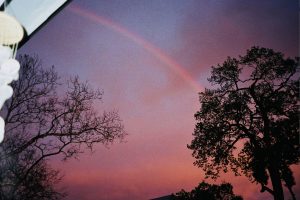
References
Baer, R. (1976). Our Need to Control: Implications for Environmental
Education. The American Biology Teacher.
Browning, G. K. (2018). Murdoch on Truth and Love. Palgrave Macmillan.
Loy, D.R. (2010). “Healing Ecology”. Journal of Buddhist Ethics, 17, 251-267.
Niebuhr, R. (1995). The Nature and Destiny of Man: A Christian Interpretation. Westminster John Knox Press.
Pollan, M. (1991). Second Nature: A Gardener’s Education. Grove Press.
Singer, P. (1990). “All Animals Are Equal”. In Animal Liberation, 2, 269–271. New
York Review/Avon Books, Inc.
